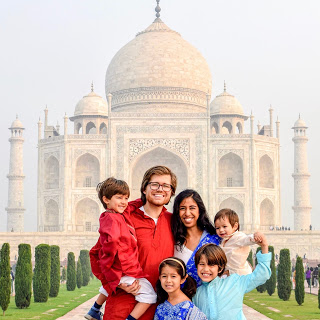10 Lessons from 20 Countries in 2018
Contributed by Daniel Harbuck
Condensed from hundreds of lessons the world taught us while traveling as a family of six this year. After all, you seldom appreciate a moment for everything it’s worth while you are in it.
-
Four is the new ten Based on the whispers, extended glances and hundreds of photographs, either we have some visibly contagious disease of which we remain woefully unaware, or traveling with four kids is decreasingly common. My grandma took five kids under the age of five, solo, from Utah to Missouri and back. I grew up in a family that road-tripped to the ends of the Earth with five kids, so I’m not congratulating myself for the decidedly unglamorous. We are forever thankful for their examples, an increasingly-accessible world, and the modern marvel of paternity leave.
This post may contain affiliate links, which means I may earn a small commission if you click my link but does not change your price. See my affiliate policy here.
-
Behind every world-changer is a faithful friend Surround yourself with people who care about you enough to correct and encourage you. Even better, be that for someone else. We would have no Van Gogh without Theo, no Joan of Arc without a believing Charles of Valois and no Gandhi without Gopal Krishna Gokhale. The impact of these and a million others may never have been known without the trusted support of another.
-
Unless you invented pizza or mango sticky rice, you will have to choose between pleasing everyone or changing the world. From Monet to Mozart, mastery of the day’s masterworks predicated becoming the timeless master of tomorrow. These makers of major movements clearly gained experience in the known before marvelously venturing into the unknown. Even still, the movement-making, world-changing artists, architects, leaders and others never seem to have pleased everyone in their time – even in their own families – or seen the full effect of their work in their lifetime for that matter.
-
“You have to go through Purgatory to get to Paradise” – Dante (indirect quote – see The Inferno) I mean, in a family of six, someone either just had to go to the bathroom or someone is about to (which is also what made Tokyo’s musical toilets so magical after unplumbed Turkish toilets throughout Southeast Asia). The idea of the perfect trip escapes me: there are hangry tantrums, tired feet, petty pouts and lost lovies – and that’s just the grown-ups. But if you look hard enough, between the forgettable (or hopefully forgotten) periods, there are those attitude-affecting epiphanes, those moments of irreplaceable human connection, a centered focus as a family that you would give anything to bottle up to make last forever.
-
Be here That’s part of what makes me so fond of traveling with kids: theirs is a gift of presence. If you ask our six year old what her favorite place/food/experience is, it will likely be the one she is experiencing right then. Our three-year old constantly tugged on my pants to point out another clock or flag or window hanging. The glories all around us are sometimes best perceived by children, and I hope to enjoy where I am with half of the intended focus of a child.
-
The US is Young (and has reason to be hopeful) If European cathedrals appeared in the last few seconds of a 24-hour world history, then ours is clearly a young nation. And if young, then moldable. There is too much building for us yet to do to let fear of difference interfere.
-
Thick walls + tiny windows = darkness The middle ages across the world are characterized by a lack of light, not only architecturally, but also intellectually. I’m not convinced that such is unrelated to the ongoing feudalism that prohibited human happiness in progress. When we more carefully protect what we have, and, in some ways, what we are, we may be restricting our own growth, limiting our learning and lifelong happiness.
-
Working class is the new royalty If we can get past the constant comparisons “with the Joneses” a clearer vision of the wealth of our opportunity will prevail. A working class citizen of the free world can experience daily enjoyments unmatched by the world’s wealthiest citizens even a short hundred years ago. Queens of the 17th century died in childbirth at 100 times the rate moms do today. We fuss over travel delays on modes of transportation 19th century US Presidents and Roman Emperors of the known world could not imagine. We have traded a single pair of handspun clothing for closets full of affordable outfits, often delivered to our door. You can’t find a human skeleton from the middle ages that does not show signs of severe malnutrition, while you and I have the freedom to choose between a whole isle of salad dressing. I don’t mean that humanity has peaked, but this realization comes with a tidal wave of gratitude.
-
“Every generation gets the Stonehenge it deserves” (Jaquetta Hawkes) And, as Angkor Wat silently teaches all who enter, even stones don’t last forever. When you explore structures where the tumult and the shouting has died, it is easier to focus our energy on what lasts. Hint: it’s the people in our lives, who probably need healing more than we realize.
-
Is one ever truly finished with anything?” Leonardo da Vinci, upon being asked when the Mona Lisa would be finished after he’d already been carrying it around and improving it daily for more than two years. Not that anything in my life could be compared to La Gioconda, but this recognition of life’s unresolved status actually gives me a firmer resolution to do, and be, better. And that I should not be surprised when it requires daily effort. So it is with cities and nations and governments and projects and people. And, like da Vinci, we do best when we acknowledge the hand of God through it all.












[…] as we were preparing to spend 10 weeks in Europe during paternity leave, I knew I needed a lens that could capture a bit more. The 35mm is wonderful. But knew it […]